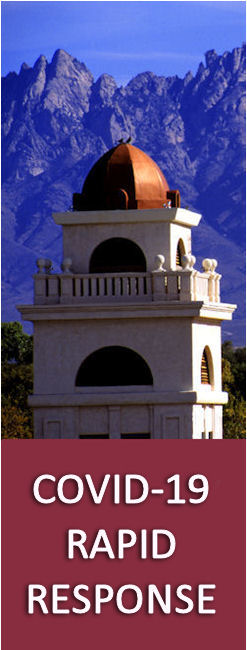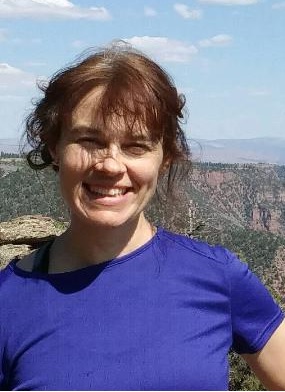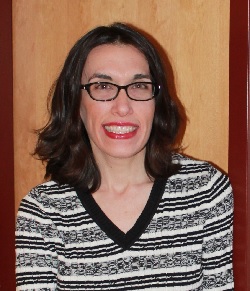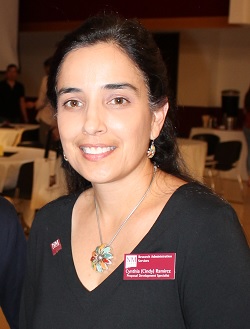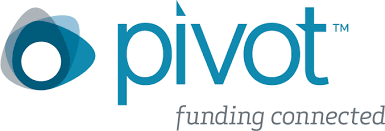 |
|||||||||||||
Evidence-Based Decision Making for NMSU COVID-19 Rapid ResponseBy Luis Cifuentes, Vice President for Research and Dean of Graduate SchoolPresident Floros asked me, as he did others, to think long and hard about the question, “go fully online, or bring students back on campus on a limited basis,” and to be prepared to answer at the July 29th COVID-19 Rapid Response Team meeting. I spent the weekend thinking, will NMSU follow the 50% of academic institutions that go fully online this Fall, or the 50% who plan to open up campuses on a limited basis? The philosopher and essayist, George Santayana, famously wrote in The Life of Reason, “Those who cannot remember the past are condemned to repeat it.” That was written 13 years before the Flu Pandemic of 1918 which took the lives of 20 to 50 million people. Most universities cancelled face-to-face classes in response to the COVID-19 outbreak last Spring. Genevieve Carlton, professor of history at the University of Louisville, wrote, “The history of closing colleges because of epidemics dates back nearly as long as higher education itself.” The article, Higher Education and Pandemics – A History of Universities and Viral Outbreaks, notes that during the Flu Pandemic of 1918, “Stanford University isolated anyone affected by the flu and ordered students to wear flu masks at all times;” “the entire UNC [University of North Carolina] campus went under quarantine;” and “students [at Smith College] dubbed themselves ‘farmerettes,’ promising to prevent food shortages by heading to the fields where they dug up potatoes and harvested crops.” Professor Carlton closes by saying, “Today's technologies make it much easier to protect students by closing campuses. Isaac Newton may have spent his plague year perfecting scientific formulas, but for most students shutting down school once meant an end to their academic progress.” My experience leading the Return to Research and Creativity initiative this summer, NMSU System’s commitment to evidence-based decision making that relies on expertise in our academic community, and my confidence that today’s science and technologies make it easier to protect students, faculty, and staff on campus, led me to argue for the latter option. What do I mean by evidence-based decision making? Principal investigators with approved Return to Research and Creativity Safety Plans were asked in late July: “Given the current situation, which are you most comfortable with as we move into August? Return to Phase 2: ‘critical research’ limited to 15-35% normal levels of on-site personnel; stay in Phase 3: 35-50% of normal; or move to Phase 4: 50-70% of normal.” Over 85% of 215 respondents, many of whom are faculty, wished to remain in Phase 3 or move to Phase 4. NMSU scientists, engineers, and social scientists are deeply involved in addressing the challenges before us. Dean Enrico Pontelli (Dept. of Computer Sciences) and his team are creating a phone app and web portal that will be ready to deploy when classes start. The app and portal will support the activities of health monitoring and contact-tracing for the NMSU community. The app provides features on a mobile device, in addition to the ability of voluntarily providing presence on campus via GPS location. Professor Joe Tomaka (School of Public Health) is using the Electronic Caregiver© (ECG) Premier telehealth system to monitor COVID-19 symptoms of over 100 NMSU students and employees. Monitoring began in June and will continue through the Fall semester. In addition to the use of ECG screening and referral services, his program examines self-reported behaviors and attitudes associated with the disease, prevention, workplace safety, and the ECG technology using online survey methods. The ability to get COVID-19 test data rapidly is critical. Associate Dean Jim Murphy (Dept. of Astronomy) with the support of Chancellor Dan Arvizu, bolstered by the reputation of Professor Kathryn Hanley (Dept of Biology), created a partnership with Albuquerque-based TriCore Reference Laboratories to establish a branch lab at NMSU that will provide local analytical testing capacity for COVID-19. NMSU will receive $1 million in funding from the New Mexico Department of Health to support the lab, which will also provide much-needed testing capability in the Paso del Norte region. Professors Christopher Sroka and Patrick Trainor (Department of Economics and International Business) and Brook Milligan (Department of Biology) will estimate the prevalence and spread of COVID-19 at NMSU. Secondary data will be obtained from the TriCore partnership. The team will use the dataset to build a statistical model for estimating disease dynamics. A later phase of the project will sample members of the NMSU community for testing, and the results of the campus testing will be input into the model. Model output will inform university administrators on what actions to take to help limit the spread of COVID-19 among the NMSU community. Professors John Xu (Department of Biology), Yanyan Zhang (Department of Civil Engineering) and Willis Fedio (Department of Extension Family and Consumer Sciences) will analyze wastewater/sewage for the presence of the coronavirus at selected locations on campus as a surveillance method for assessing the prevalence of the virus within the on-campus community. Dean Enrico Pontelli and I (Department of Geology), with assistance of many, are establishing a secure data center to monitor and understand the pandemic within NMSU System’s auspice; assist with contact tracing and isolation; predict patient-provided symptoms as it relates to positive/negative results, and create actionable information for leaders to derive quick decisions (e.g. pivoting to online education, ceasing fall semester, etc.). Finally, we have the expert advice of Professor Kathryn Hanley, our own NMSU Regents Professor and virologist, who recently shared some of her expert insights in a thoughtful piece about living with the coronavirus. We are thankful to those experts in our academic community who have stepped-up. If you can join the NMSU community of experts who are contributing evidence-based data that can help address the challenges we face, please contact me. Be safe, healthy, and productive. |
|
||||||||||||
Funded by National Science Foundation, NMSU Biology Professors Study the Potential for COVID-19 SpillbackBy Hamid Mansouri Rad, Senior Proposal Development Specialist, RAS
Dr. Kathryn Hanley, NMSU Regents’ Professor of Biology and Dr. Teri Orr, Assistant Professor of Biology at NMSU, along with their collaborator Dr. Tony Goldberg, Professor of Epidemiology at University of Wisconsin School of Veterinary, have been awarded an NSF grant to study the possible risk of the spread of coronavirus from humans into North American bats. As Dr. Hanley explains, SARS-CoV-2, the novel coronavirus that causes the disease COVID-19, jumped into humans from wildlife, most probably a species of Old World bat. Therefore there is concern that the virus could jump from humans into New World bats, a process called “spillback”. Spillback would aggravate and possibly extend the current pandemic. “A major barrier to identifying which North American bat species are at greatest risk of SARS-CoV-2 spillback is the current lack of knowledge about the distribution of coronaviruses in North American bats,” she states. “To close this gap, we are characterizing 17 target bat species in the Southwest U.S. for their “viromes” (all viruses, with an emphasis on coronaviruses) and the sequence of their cellular receptor, ACE-2, to which SARS-CoV-2 binds. We will, then sample within species, bats of different sexes, ages and breeding status.” The goal of this projects to combine molecular data with information on bat behaviors, migration, group size, and tendency to live near humans, to predict risk of spillback of SARS-CoV-2. Dr. Kathryn Hanley could be reached at khanley@nmsu.edu. Dr. Teri Orr can be reached at teriorr@nmsu.edu.
|
Dr. Kathryn Hanley, Regents
|
||||||||||||
Meet Dr. Héctor Luis Díaz, NMSU's Director of the School of Social WorkBy Hamid Mansouri Rad, Senior Proposal Development Specialist, RAS
During his academic career, Dr. Díaz has been awarded 55% of the total $1,425,100 external funds he has requested. This is significant given that he has spent the last 20 years of his life in academic administration. Dr. Díaz can be reached at hdiaz@nmsu.edu.
|
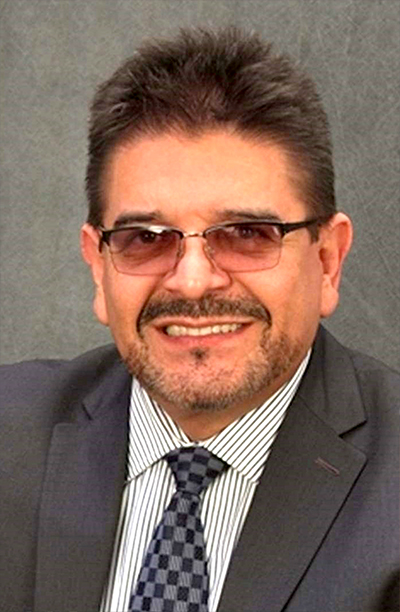 Dr. Héctor Luis Díaz,
|
||||||||||||
Research Administration Spotlight: Laura Bolivar AnayaBy Hamid Mansouri Rad, Sr. Proposal Development Specialist, RAS
In addition to developing and submitting proposals, staff from NMSU’s Research Administration Services (RAS) keep track of proposals submitted and awards received using the Academic Research Grant Information System (ARGIS). One of the RAS staff who plays a key role in maintaining records in ARGIS is Ms. Laura Bolivar Anaya. Working closely with the ARGIS system administrator at Research IT, Laura is in charge of data management and accuracy in ARGIS. She analyzes the proposals and awards processes to ensure principal investigators comply with agreed upon deliverables. She also gathers various closeout documents and makes sure proper closeout documentation is submitted per sponsor requirements. Before joining RAS in 2004, Laura worked at University of Texas at El Paso for nine years. She enjoys sewing, embroidery and quilting, which she calls “self-gratifying” yet “pricey.” She is self but by now well confident in her work. “This is an evolving hobby that is constantly changing and keeping up with the new trends is a must,” she reveals. “I own various sewing machines and someday I will become a Bernina Babe”. Laura can be reached at anayal@nmsu.edu.
|
Laura Bolivar Anaya, Research Administration Services |
||||||||||||
NASA EPSCoR Awards NMSU a Cooperative Agreement for Research and DevelopmentBy Paulo Oemig, Director, NM NASA EPSCoR/NM Space Grant Consortium, Administrative Principal Investigator
Dr. Igor Sevostianov can be reached at igor@nmsu.edu.
|
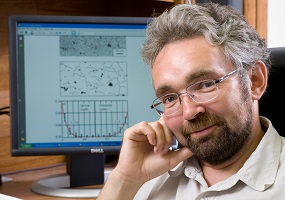
Dr. Igor Sevostianov,
|
||||||||||||
Workshop for Researchers on Program Evaluation on August 21, 2020By Hamid Mansouri Rad, Senior Proposal Development Specialist, RAS
Dr. Rachel Boren, the director of NMSU's Southwest Outreach Academic Research (SOAR) Evaluation and Policy Center will hold an online workshop on Friday August 21, 2020 from 11:00am to 12:00 noon. "Evaluation can strengthen your proposal," states Dr. Boren. Geared toward faculty and staff researchers, this workshop will discuss critical topics related to program evaluation. Researchers who are involved in externally funded research or education programs, or who intend to develop proposals in those areas are highly encouraged to participate in this workshop. This event will also provide helpful tips for program evaluation outside of grant applications for those who need to regularly collect data for continuous improvement and to measure project impact. The workshop topics include:
Dr. Rachel Boren earned her Ph.D. in Educational Research, Statistics, and Evaluation from the University of Virginia and is an expert in program evaluation and research methods in education and the social sciences. She has worked in research and evaluation in colleges and universities across the country and was the Director of Evaluation for a 70 million-dollar National Institutes of Health funded center based at the University of Washington. To register for the workshop please send email to hamid@nmsu.edu. Dr. Boren could be reached at rboren@nmsu.edu. |
Dr. Rachel Boren, Director,
|
||||||||||||
The 2019-20 Principal Investigator (PI) Academy Was A SuccessBy Cindy Ramirez, Proposal Development Specialist, RAS“Grant writing is the end of a process, not the beginning. Long before you make the decision to write a grant proposal for your research, you should be taking concrete steps to raise your profile in the eyes of reviewers” (Stone, 2010). |
Cindy Ramirez, Proposal
|
||||||||||||
NSF Funding Opportunity for Applicants Pursuing Graduate Degrees in STEM AreasBy Hamid Mansouri Rad, Senior Proposal Development Specialist, RAS
NMSU graduate students are encouraged to take advantage of the NSF Graduate Research Fellowship Program (GRFP). This program provides three years of support to exceptional graduate students pursuing master's or doctoral degrees in STEM areas or STEM education full time. NSF encourages women, members of underrepresented minority groups, persons with disabilities, veterans, and undergraduate seniors to apply. Please note that the GRFP applicants must be either US citizen or permanent resident, and are limited to submitting only one application per year. In addition, there are other important eligibility requirements that applicants are encouraged to closely review before applying. The upcoming deadlines vary depending on the area and are as follows:
For more information please contact Ms. Chong-Hwey Fee in Research Administration Services.
|
 |
||||||||||||
Points of Contact for All Research Compliance QuestionsDo you have questions about training or other requirements for your research activity? The following contacts can help you with specific topics:
Alternatively, you may send an email to ovpr@nmsu.edu or call (575) 646-7177.The Office of the Vice President for Research and Dean of Graduate School can connect you for help with any of your research needs. |
|
||||||||||||
Pivot Funding Opportunity Database
This is a reminder that in order to assist NMSU faculty and staff in locating external funding opportunities, the Office of the Vice President for Research and Dean of Graduate School has purchased a subscription to ProQuest’s Pivot software.
To request a one-on-one or group Pivot training, send email to hamid@nmsu.edu.
|
|
||||||||||||
Limited Submission Funding Opportunities
The Office of Research Administration Services lists limited submission funding opportunities at https://limitedsubmission.nmsu.edu. We encourage NMSU faculty and staff to periodically visit the site and if they are interested in any of the opportunities to please inform us by sending email to ls-ras@nmsu.edu. As a reminder, the site is only accessible on campus. Accessing the site using off-campus computers require first downloading and logging in through NMSU's VPN at https://vpn.nmsu.edu.
|
|
||||||||||||
Graduate School |
|||||||||||||
Have We Been/Being Tested?By Luis A. Vazquez, Regents Professor and Associate Vice President for Research and Graduate Studies Time has kind of slowed down for many of us and we started to engage through technology, how to talk to each other as we saw each other on screen. We have probably never noticed so many things about each other that we would have never thought about without such a strong focus of the images on the video camera. While at home, many of us rearranged our furniture a few times, did house projects, spring/summer cleaning, painted rooms, and got to know each other better. Then, we took pictures and shared them with each other. Some of us got to know our loved ones better and we persevered, what a challenge for a few or many. At times we went shopping for necessities and discovered that we could hide our facial expressions with each other, as long as we did not roll our eyes when wearing our masks. What an experience to be congruent with what we felt for the other person, whether it was a smile or a frown, right in front of the person. Then we catch ourselves and for some of us, we felt guilty and for others we laughed within ourselves. For so many of us, we had transformed our frustration, anger and anxiety into caring expressions of love and for others we were looking for that expression of love from each other. We know it has been challenging and hard during these last 5 months and not all of us have the grit to take this all on, but we sure can help each other out by borrowing from each other’s strong spirits of caring and sharing and take turns doing it. Just like in kindergarten, many years ago,
|
|
||||||||||||
|
Questions and comments regarding NMSU’s Research and Graduate School Digest should be directed to Hamid Mansouri Rad, Ph.D. at hamid@nmsu.edu, (575) 646-6429. |
|||||||||||||
